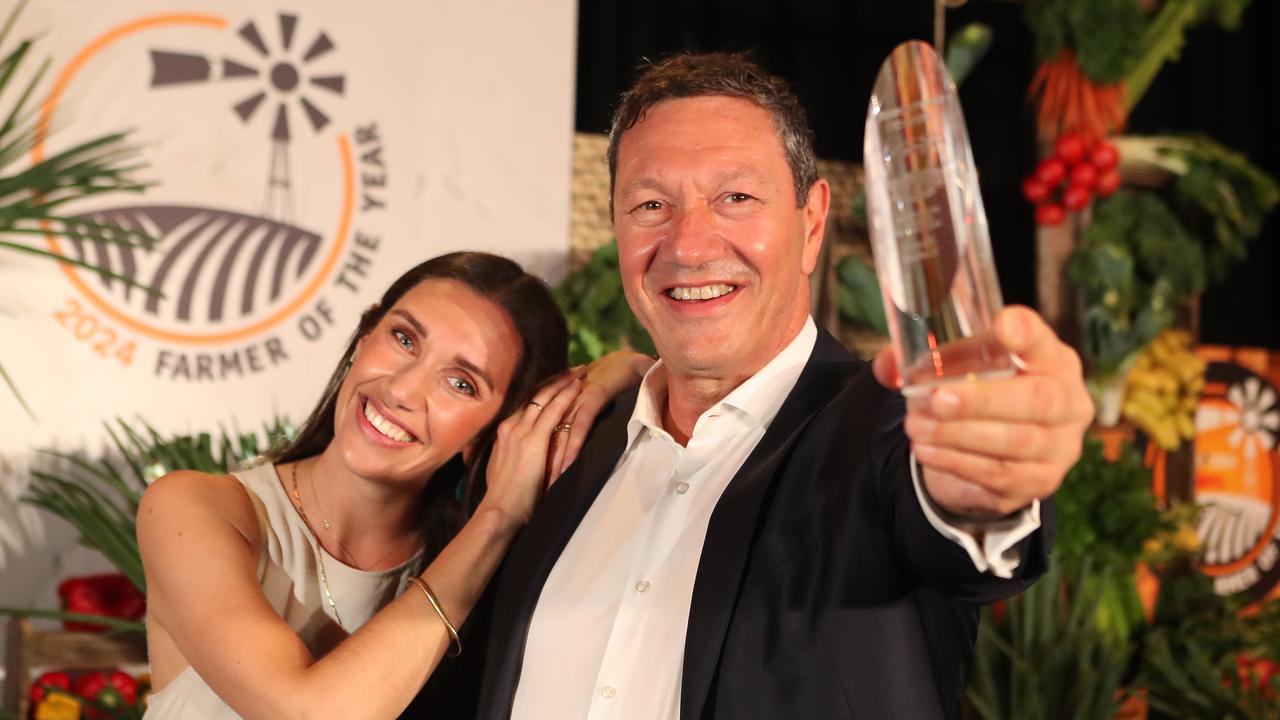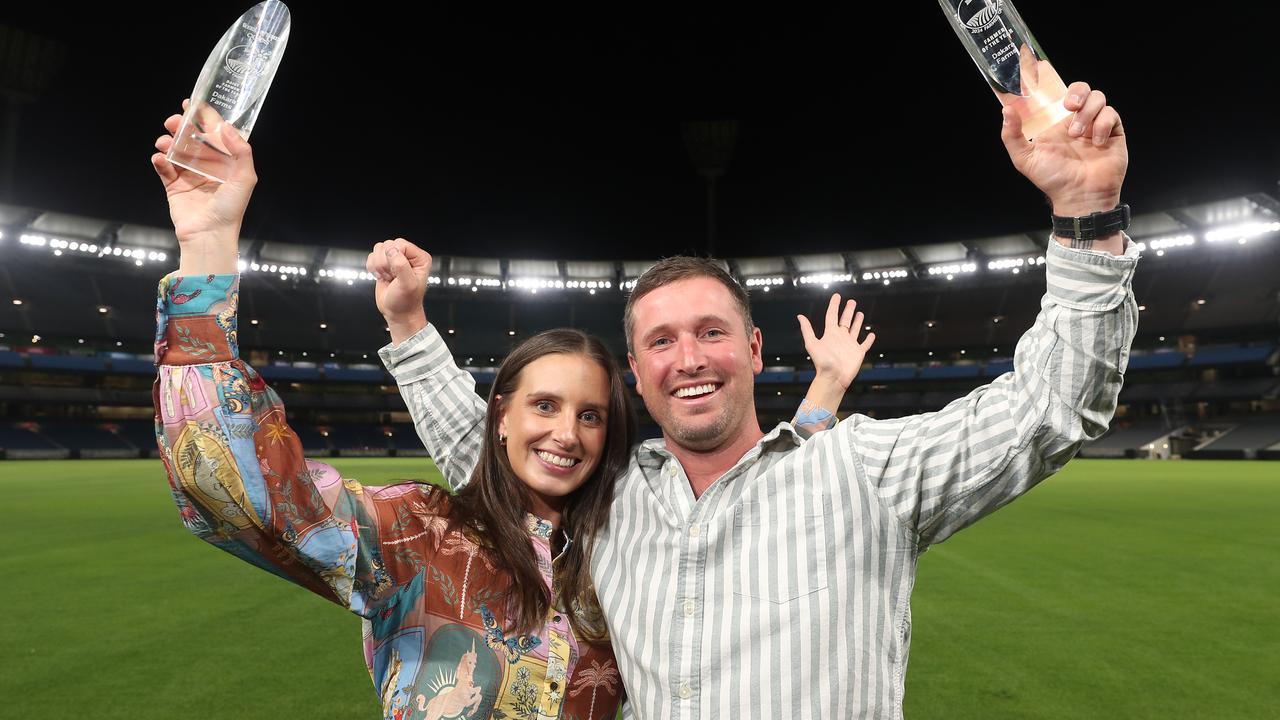Stephen and Tanya Walter of Burrum Biodynamics at Marnoo look outside the square
STEPHEN Walter is fond — he confesses — of greeting visitors to his Wimmera cropping farm with a garden fork.

STEPHEN Walter is fond — he confesses — of greeting visitors to his Wimmera cropping farm with a garden fork.
“I love taking people out to the paddocks and digging up the soil with my garden fork and hearing their ooos and aahs,” said the fifth-generation farmer.
“They marvel at the soil. It’s great to see the soil healthy and alive.
“It makes me wonder why I didn’t do this farming years ago. I would never see myself farming any other way.”
The farming Stephen is referring to is biodynamics.
And while it is seen as an unconventional method for most pastoral enterprises, when it comes to biodynamic cropping, the margin of difficulty is all the greater, given he uses no pesticides, herbicides or fertilisers.
Yet, as his frequent garden forking demonstrations reveal, Stephen and his wife Tania have made a success of their Burrum Biodynamics business, on their 1091ha property near Marnoo.
Since first dabbling in biodynamics in 2000, and becoming fully certified in 2008, the Walters have cropped green and red lentils, field peas, barley, spelt and oats, some of which they process on farm and market and distribute under their own label.
In addition, they run 900 Merino-Dohne ewes, shearing for 18-micron wool and selling up to 300 wether lambs a year.
Chat to quietly spoken Stephen and it’s clear his decision to turn biodynamic was motivated by one simple idea: soil health.
“I could just see the treadmill of chemicals was going nowhere. There was always another problem and the only solution was in a drum,” the 50-year-old father of three said.
“It just didn’t seem sustainable to me.”
He said the most difficult task in converting his family’s conventional cropping farm — bought by his parents Allen and Barbara in the 1950s — was “making the mind shift”.
“It was making the jump and trusting nature and hoping plants weren’t going to die.”
The next step was the practical stuff — how to actually crop using no inputs.
Stephen’s knowledge comes from Australia’s biodynamic pioneer Alex Podolinsky at the Bio-Dynamic Research Institute, as well as books and visiting like-minded farms.
He opted not to farm legumes, which get swamped by weeds and are a risk with pests, and instead focused on cereals.
He removed wheat from the crop rotation “because the demand was not there for organic wheat and it doesn’t compete as well as oats and barley with weeds”.
And it was the same decision for canola.
Once he’d planted oats and barley, Stephen decided to expand into spelt and then the easier growing peas, with lentils his most challenging crop that experienced a few initial failures.
He moved out of direct drilling back to old-fashioned cultivation and changed many farm machines and equipment.
The Walters have increased their green manure crops to about two times in a six-year rotation, the key source of their soil fertility.
So, for instance, he might grow a crop for two years, plant green manure, followed by another crop, before turning the paddock out to pasture for five years.
A key principle of biodynamic farming is the use of preparation 500, or cow-horn manure, which they apply once a year to the property, with occasional use of guano.
The flock of 900 Merino Dohne-cross ewes is also a critical element in the pasture phase of the farming calendar.
“I don’t think you can run a natural system without livestock for weed control and for recycling nutrients into the soil.”
As for pests and diseases, he has none to report.
Stephen said while some yields had dropped, income was more consistent mainly because there was no inputs and they received a premium for their product.
Generally, they get about three tonnes to the hectare for oats, up to seven tonnes/ha for barley, two tonnes/ha for spelt and about three bags for peas and lentils.
It was the tricky-growing lentils that led to their on-farm processing facility. When their first successful crop of lentils was damaged from high rainfall in 2010 — “their skins were like fingers in the bath, all shrivelled” — Stephen said he looked for organically-certified processors to split the lentils.

Finding none, he instead invested in his own machines.
The investment led to the launch of their label, Burrum Biodynamics, which splits lentils and peas, dehulls spelt, takes the inedible husk off barley to pearl it, and pearls spelt, scratching the seed to make it absorb moisture easily (“it’s like rice”).
Within a few months they will be producing rolled oats.
Roughly 30 per cent of their on-farm processed crop is sold under their own label, online through Farmhouse Direct and also at farmers’ markets and specialty shops and cafes. The remainder is sold to Mt Zero Olives.
While the greater part of their income is from their own processing, half their crop is sent off farm and sold, for instance, as barley feed for organic dairy herds.
“There seems to always be more demand than supply. We don’t go looking for markets.”


